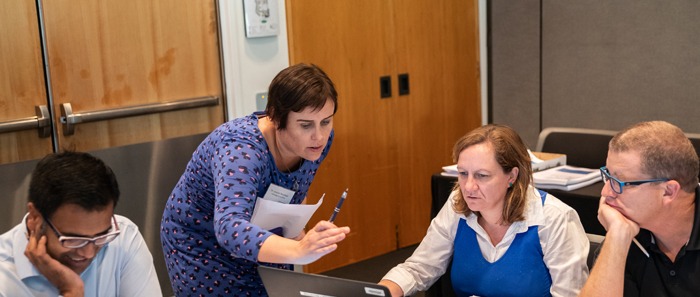Cancer
Genomic testing offers personalised treatment for patients with myeloid blood cancers

Dr Louise Seymour is involved in Queensland Genomics’ Myeloid and Leukaemia clinical projects. Louise’s expertise and involvement was also integral to Queensland Genomics’ work to bring Melbourne Genomics’ Somatic Variant Curation Workshop to Brisbane in 2019.
Where have you seen genomics have the most impact?
I’m involved in the Queensland Genomics’ Myeloid Cancer project. In a patient with newly diagnosed acute myeloid leukaemia, the core myeloid gene panel was performed which identified a number of high risk mutations. Based on this information, their disease risk status was found to be high risk based solely on the genomic data. Prior to genomic sequencing, this patient would have been unlikely to proceed to immediate allogeneic bone marrow transplant, however based on these results the patient’s management plan was changed to recommend an upfront transplant as the best option to maximise achieving a durable remission.
I also spent four months in the Department of Hematopathology at Massachusetts General Hospital in Boston, USA in early 2017/2018. It was there that I saw first hand how important an integrated genomics service is in the diagnosis, risk stratification and treatment for patients with haematological malignancies. It was very interesting to observe how seamlessly genomic data was incorporated into clinical decision making. It became clear how essential it was to introduce this technology into routine clinical practice in Queensland.
What do you see as the future of genomics in haematology/pathology?
I am hopeful that in the next few years, we will see a comprehensive genomics service fully integrated into the patient journey from diagnosis and prognosis through to personalised therapy. With the assistance and support of Queensland Genomics, Pathology Queensland has instituted a comprehensive genomics strategy which will pave the way for the seamless integration of new genomic tests into clinical diagnostics.
What is one thing that needs to change to get there?
There are many things that still need to change, with the most important two being a sustainable funding model and a sustainable workforce. Genomic testing and clinical integration requires highly trained staff including dedicated, highly specialised variant curation scientists, bioinformaticians, quality officers, pathologists, researchers, nurses and clinical haematologists. In order to attract and retain such staff, the funding model needs to be sustainable.
